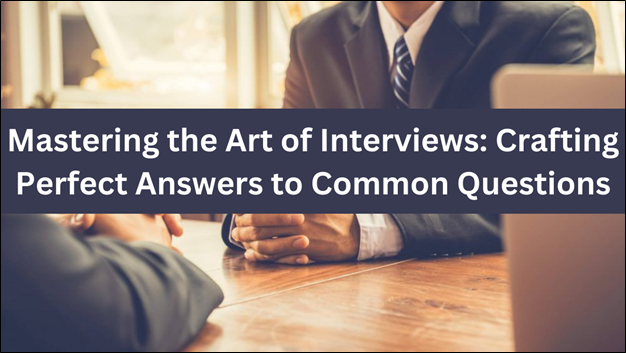Mastering the Art of Interviews: Crafting Perfect Answers to Common Questions

Introduction:
Job interviews can be nerve-wracking experiences for even the most seasoned professionals. One of the key challenges lies in answering interview questions effectively. From the classic "Tell me about yourself" to the dreaded "What is your greatest weakness?" each question poses an opportunity to shine or stumble.
In this article, we'll explore the art of interview answers and questions. We'll delve into the strategies and techniques that can help you craft unique and memorable responses, setting you apart from the competition. By the end, you'll be well-equipped to handle interviews with improved interview Skills and Get Success confidence, and poise. .
- Preparing for the Unpredictable:
While you can anticipate many interview questions, there's always room for curveballs. Start your preparation by thoroughly researching the company and the role you're applying for. Understand their culture, values, and objectives. This will help you align your responses with what they're looking for.
- Crafting the Perfect Elevator Pitch:
"Tell me about yourself" these words often strike fear into the hearts of interviewees. Your response should be a concise summary of your professional journey, highlighting key accomplishments and experiences that are relevant to the role. Keep it brief, engaging, and enthusiastic.
- Showcasing Your Strengths:

When asked about your strengths, don't just list them; provide examples of how they've been assets in your previous roles. This gives credibility to your claims and shows the interviewer that you're not just talking the talk but walking the walk.
- Tackling the Weakness Question:
The dreaded "What is your greatest weakness?" question is an opportunity to demonstrate self-awareness and growth. Choose a genuine weakness that you've worked on and explain how you've overcome or are actively addressing it. This shows your commitment to personal development.
- Behavioral Questions:
Behavioral questions are designed to assess how you've handled situations in the past. Use the STAR method (Situation, Task, Action, Result) to structure your answers. Provide specific examples that showcase your problem-solving skills, teamwork, and leadership abilities.
- Handling the Salary Question:
Questions about salary expectations can be tricky. Research industry standards and give a range rather than a specific figure. Emphasize that your primary focus is on the opportunity and the value you can bring to the company.
- Asking Questions:
Remember, interviews are a two-way street. Prepare thoughtful questions to ask the interviewer. This demonstrates your interest in the company and your desire to make an informed decision.
- Navigating Tricky Scenarios:
Sometimes, interviewers may ask tough questions to gauge your resilience and adaptability. Stay composed and don't be afraid to ask for clarification if needed. Take a moment to gather your thoughts before responding.
- The Importance of Nonverbal Communication:
Your body language, tone, and facial expressions are just as important as your words. Maintain eye contact, use confident posture, and speak clearly and confidently. These nonverbal cues can greatly impact the impression you leave.
- The Power of Practice:
Practice your responses with a friend or mentor. Receiving feedback and refining your answers can boost your confidence and help you articulate your thoughts more effectively during the interview.
Conclusion:
Interviews may be challenging, but with the right preparation, you can navigate them with ease. Crafting perfect answers to common questions involves research, self-reflection, and practice. Remember, every interview is a chance to showcase your skills and personality. Approach each one with confidence and a positive attitude, and you'll be well on your way to securing the job of your dreams. Good luck!










